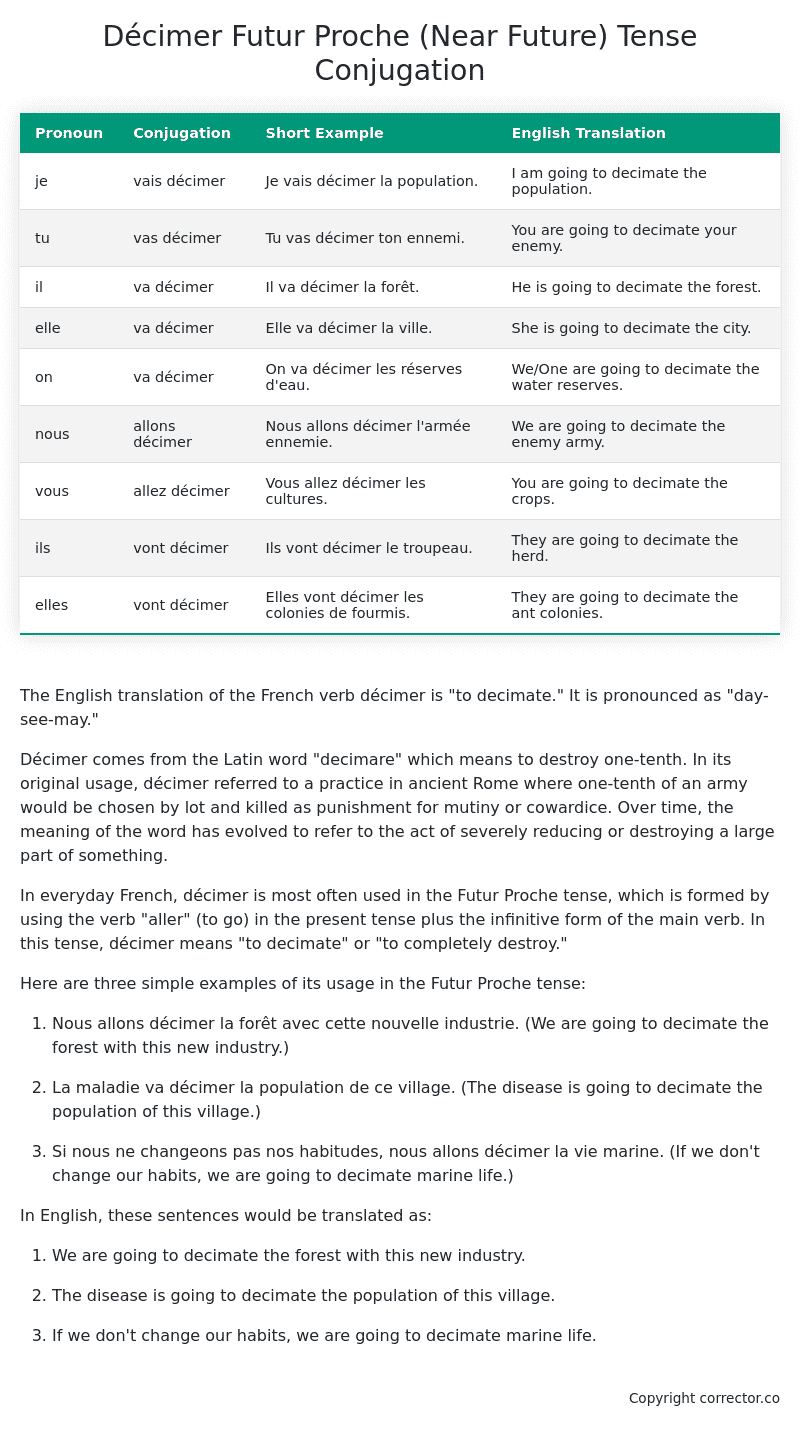Futur Proche (Near Future) Tense Conjugation of the French Verb décimer
Introduction to the verb décimer
The English translation of the French verb décimer is “to decimate.” It is pronounced as “day-see-may.”
Décimer comes from the Latin word “decimare” which means to destroy one-tenth. In its original usage, décimer referred to a practice in ancient Rome where one-tenth of an army would be chosen by lot and killed as punishment for mutiny or cowardice. Over time, the meaning of the word has evolved to refer to the act of severely reducing or destroying a large part of something.
In everyday French, décimer is most often used in the Futur Proche tense, which is formed by using the verb “aller” (to go) in the present tense plus the infinitive form of the main verb. In this tense, décimer means “to decimate” or “to completely destroy.”
Here are three simple examples of its usage in the Futur Proche tense:
-
Nous allons décimer la forêt avec cette nouvelle industrie. (We are going to decimate the forest with this new industry.)
-
La maladie va décimer la population de ce village. (The disease is going to decimate the population of this village.)
-
Si nous ne changeons pas nos habitudes, nous allons décimer la vie marine. (If we don’t change our habits, we are going to decimate marine life.)
In English, these sentences would be translated as:
-
We are going to decimate the forest with this new industry.
-
The disease is going to decimate the population of this village.
-
If we don’t change our habits, we are going to decimate marine life.
Table of the Futur Proche (Near Future) Tense Conjugation of décimer
| Pronoun | Conjugation | Short Example | English Translation |
|---|---|---|---|
| je | vais décimer | Je vais décimer la population. | I am going to decimate the population. |
| tu | vas décimer | Tu vas décimer ton ennemi. | You are going to decimate your enemy. |
| il | va décimer | Il va décimer la forêt. | He is going to decimate the forest. |
| elle | va décimer | Elle va décimer la ville. | She is going to decimate the city. |
| on | va décimer | On va décimer les réserves d’eau. | We/One are going to decimate the water reserves. |
| nous | allons décimer | Nous allons décimer l’armée ennemie. | We are going to decimate the enemy army. |
| vous | allez décimer | Vous allez décimer les cultures. | You are going to decimate the crops. |
| ils | vont décimer | Ils vont décimer le troupeau. | They are going to decimate the herd. |
| elles | vont décimer | Elles vont décimer les colonies de fourmis. | They are going to decimate the ant colonies. |
Other Conjugations for Décimer.
Le Present (Present Tense) Conjugation of the French Verb décimer
Imparfait (Imperfect) Tense Conjugation of the French Verb décimer
Passé Simple (Simple Past) Tense Conjugation of the French Verb décimer
Passé Composé (Present Perfect) Tense Conjugation of the French Verb décimer
Futur Simple (Simple Future) Tense Conjugation of the French Verb décimer
Futur Proche (Near Future) Tense Conjugation of the French Verb décimer (this article)
Plus-que-parfait (Pluperfect) Tense Conjugation of the French Verb décimer
Passé Antérieur (Past Anterior) Tense Conjugation of the French Verb décimer
Futur Antérieur (Future Anterior) Tense Conjugation of the French Verb décimer
Subjonctif Présent (Subjunctive Present) Tense Conjugation of the French Verb décimer
Subjonctif Passé (Subjunctive Past) Tense Conjugation of the French Verb décimer
Subjonctif Imparfait (Subjunctive Imperfect) Tense Conjugation of the French Verb décimer
Subjonctif Plus-que-parfait (Subjunctive Pluperfect) Tense Conjugation of the French Verb décimer
Conditionnel Présent (Conditional Present) Tense Conjugation of the French Verb décimer
Conditionnel Passé (Conditional Past) Tense Conjugation of the French Verb décimer
L’impératif Présent (Imperative Present) Tense Conjugation of the French Verb décimer
L’infinitif Présent (Infinitive Present) Tense Conjugation of the French Verb décimer
Struggling with French verbs or the language in general? Why not use our free French Grammar Checker – no registration required!
Get a FREE Download Study Sheet of this Conjugation 🔥
Simply right click the image below, click “save image” and get your free reference for the décimer Futur Proche tense conjugation!

Décimer – About the French Futur Proche (Near Future) Tense
Formation
1. Conjugate “aller” in the present tense according to the subject pronoun:
2. Add the infinitive of the main verb immediately after “aller.” For example:
Common Everyday Usage
Interactions with Other Tenses
Present Tense
Past Tense
Conditional Tense
Summary
I hope you enjoyed this article on the verb décimer. Still in a learning mood? Check out another TOTALLY random French verb conjugation!


